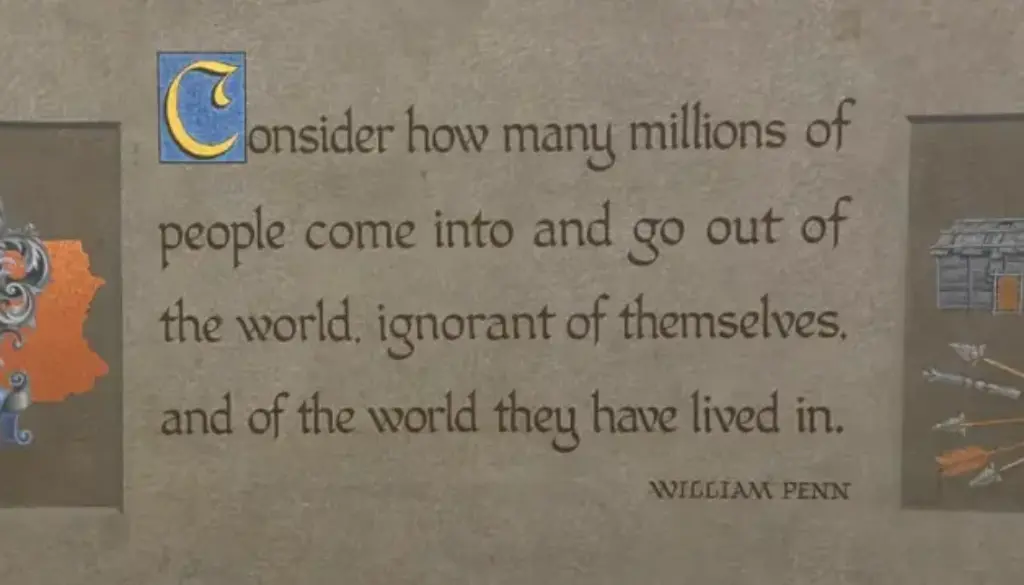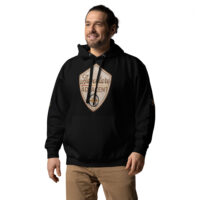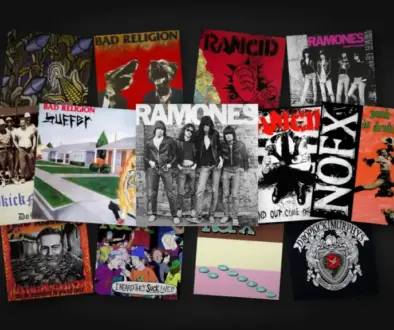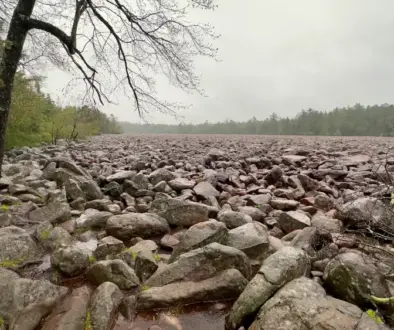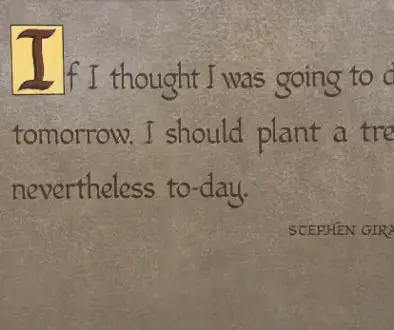How to Expand Your World Without Leaving Your Zip Code
I took this photo at the State Museum of Pennsylvania back in February. It’s William Penn’s words:
“Consider how many millions of people come into and go out of the world, ignorant of themselves, and of the world they have lived in.”
It reads like a friendly nudge: “Hey, don’t miss the good stuff.”
I looked up the quote when I got home and in the very next lines of the same little book, Penn explained we’d never leave a grand palace without noticing the gardens and fountains; so why pass through life without noticing ourselves and our surroundings? (Quod Lib.)
He wasn’t scolding, he was reminding us to pay attention.
This journal entry is my small celebration of that idea.
You don’t need a plane ticket to widen your world. You don’t even need a full tank.
Just change your angle a few degrees and move a little slower.
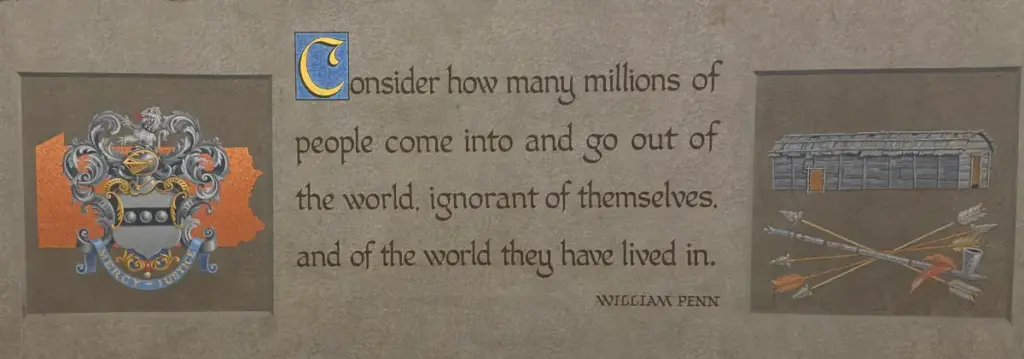
Expand Your World… by Zooming in?
Years ago, I read a scene in Zen and the Art of Motorcycle Maintenance that I’ve never shaken.
A student is paralyzed by writing a five-hundred-word essay about the whole country.
Her teacher narrows the assignment: don’t start with the country, start with the town, no, the street. No! Start with one building! No, no, no! With a single brick. Better yet, the upper-left brick of the Opera House.
Suddenly the words come. Five thousand of them.
The problem wasn’t lack of content. It was too much distance and an overly broad perspective.
Focus, then see. (Terebess)
Many of us look at travel the same way. When we try to “see the world,” we freeze up under the weight of the entire globe.
Narrow your view.
Look at one curve of a creek, one street corner, one mossy log.
That’s your upper-left brick.
Hollow Highways vs Unprocessed Pavement
Interstates are marvels of engineering but terrible teachers.
They level the hills, straighten the curves, and pull service plazas over the landscape like fitted sheets (tidy but bland).
Highways are designed to remove friction. But the cookie cutter mile markers, interstate signs, and rest areas homogenize the otherwise unrefined and unprocessed localized scenery that tells you where you actually are and who lives there.
On highways, billboards and exit numbers change, but you don’t.
They shave time off the ETA, but the currency exchanged is exploration for that quick arrival.
Back roads give you rough edges to shape into core memories. A ranch house with a homemade patio. A planter made of old BF Goodrich tires.
Those tell you more about a place than any mile marker.
The color someone paints a door or the way they stack firewood reveals their priorities.
And when the surface turns rough, and we tiptoe in low range, the world swells with detail.
Mushrooms lace a downed maple. A roadside spring burbles out of a stone face. A hawk drops off a telephone pole and toward an open lake, re-emerging with a fish in its talons.
You didn’t know any of this was there, because you’re usually on pavement, half a mile away and pushing the upper bounds of the speed limit.
Moving slowly isn’t just safer for tires and oil pans. It’s training for mindful seeing.
Penn’s Woods. An Experiment in Equality.

Penn was a Quaker, the founder of Pennsylvania, and he tried to build a place where ordinary people could live with unusual freedoms for the time: religious tolerance, representative government, and a very public experiment in getting along.
He called it a “holy experiment,” and his Frame of Government sketched out ideas that echoed far beyond his colony. (Encyclopedia Britannica)
Quakers prized plain speech, saying things directly, without fancy words.
And they famously used “thee” and “thou” long after those pronouns fell out of everyday English. It was their commitment to treat everyone equally.
That habit of directness and equality shaped the culture that grew here. (Quaker.org)
So, when Penn writes “ignorant,” he isn’t sneering.
In his Fruits of Solitude, the passage continues: “if we’d never tour Windsor Castle without noticing the gardens and fountains, why do so many people pass through life without noticing their own bodies, minds, and the world they’re in?”
It’s a lament for missed wonder.
Expand Your World, on a budget
Booked tickets and stamped passports aren’t a requirement when you can discover the world for less than the cost of lunch.
- Pick a square mile you think you know. A park you drive by all the time but haven’t visited, the neighborhood behind your grocery store, wherever. Give yourself an hour to walk it like a tourist. Read every little sign. Try to notice which trees were planted and which came from the magic of nature. Count how many kinds of mailboxes you see.
- Ride a bike where you usually drive. The slope you never noticed in a car becomes a hill with personality. The smell of fresh baked bread wafts from the deli you’ve blurred past since 2012.
- Trade one route a week for the long way. Stop at the farm stand you always promise you’ll stop at “next time” and ask the person behind the counter what’s growing weirdly well this year.
- Go mushroom watching. (Unless you already know mushrooms, don’t eat anything, please.) Collect them with your camera or a notebook. You’ll start to see patterns where each variety lives, on a stump, a fallen log, in disturbed soil, at the foot of oaks.
- Borrow the old county atlas from your library and trace one thin gray line that you’ve never taken. Chances are it follows a creek, and creeks are always worth your time.
The trick isn’t distance, it’s attention.
What the FJ keeps teaching me
My FJ is happiest in 35 zones and on forest roads. Slow going rewards you with exactly the small, clear truths Penn and Pirsig pointed toward.
The truck’s whole personality is an argument for patience: choose a line, roll on the throttle, feel the tires communicate.
You can hear different birds with the windows down at five miles an hour than you ever catch at fifty-five.
The biggest thing I’ve realized is:
I didn’t need the truck to make me see the world differently.
The world is there whether I’m in the seat of a Land Rover, Jeep, Toyota, or Schwinn.
The FJ is fun, I plan to keep it around as long as possible, but, in hindsight, I didn’t really need this to get out and go slow.
You might enjoy your purchases, but curiosity outlasts gear.
See More. Get More.
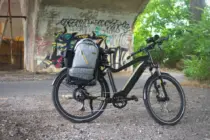
Slow travel pays off in human details too.
Highways connect cities. Back roads connect porches.
If you want to understand how people actually live, pay attention to their small choices around their homes.
When you see a Little Free Library topped with a tin rooster, you’re seeing affection expressed in wood screws and weatherproof paint.
When you find the neighborhood where every stoop has a bucket of sidewalk chalk, you can bet those blocks hum with scooters and laughter after the last school bell.
The more we see of the human condition (the real ways people solve small problems, decorate their homes, and protect their peace) the broader our understanding of people’s everyday realities becomes.
It shows us that the “other side of town” is mostly just “our side of town” with different snacks and, maybe, a better porch swing.
Micro-pilgrimages
I’ve come to think of these little outings as micro-pilgrimages.
It’s not about praying or religion though. They don’t require sacred sites; they require sacred attention.
Drive to the State Museum, stand in front of a quote, bask in it once, twice, a dozen times until it lands.
Walk the same loop you always walk but carry a notebook this time and sketch the shape of one leaf you can’t name.
Visit a historic marker you’ve ignored because it sits in a strange spot next to a tire shop. Then read the details linked to that marker and let the past sit with you for a minute.
Penn’s “holy experiment” didn’t become a museum caption overnight; it was written in real time by friends and strangers arguing about how to live. (Encyclopedia of Greater Philadelphia)
If you want to add a pinch of structure, borrow a tool from Pirsig’s teacher: give yourself one ridiculously narrow prompt each time you go out:
- Photograph only mailboxes today.
- Write one paragraph about the way water moves on the trail after last night’s rain.
- Find three colors of lichen.
- Learn about lichen’s role in the local ecosystem
Focusing on the “upper-left brick” has a way of opening the entire wall. (Terebess)
A quick nod to the past that made this present
Penn’s experiment wasn’t perfect. No experiment run by actual humans is.
But the ideas he pressed into the foundation here still matter.
He imagined a place where people of different beliefs could live together, and he built a government that tried, in its imperfect, 17th-century way, to support that.
Those principles of religious tolerance and representative rule influenced the place we live now.
We don’t have to idolize him to appreciate the inheritance. (Encyclopedia Britannica)
And the way he and his fellow Friends valued plain speech still reads as an amiable challenge: say true things simply, then go act like you mean them.
That, too, is a way of paying attention. (Western Friend)
Tips to Expand Your World
Set a 90-minute timer. Pick one. Do it.
- Pick one back road you’ve never taken between two places you already go. Leave ten minutes early. Expect to stop once and just…look.
- Visit one small museum within an hour of home. Find a single artifact or plaque that makes you curious, then look up the source later. Primary sources are a rabbit hole worth falling into.
- Walk a trail at half-speed. Count how many different plants are growing on a single dead log. You will be astonished.
- Talk to one person about the thing they maintain. A garden. A block. A food pantry shelf. Ask what they’ve learned and pay attention to the answer.
None of this requires money, gadgets, or influencer cred.
It requires a willingness to move your eyes and your feet a little differently.
The Happy Conclusion
Penn’s line is an invitation. Most of us won’t circumnavigate anything. And that’s fine. You can expand your world right where you live.
Start with a brick: the corner of a city block, the rough bark of a neighborhood oak, the cinder-block wall behind a diner where a downspout broke and rain has washed the paint thin.
When you slow down, the world shows off. And when you really see, you carry that attention to the next place, and the next conversation, and the next problem that needs a patient human.
I’ll keep taking the long way home. Trips are always more fun with friends. Come along.
Help the wheels keep rolling, and show your love of affordable adventure with clothing designed by yours truly!

